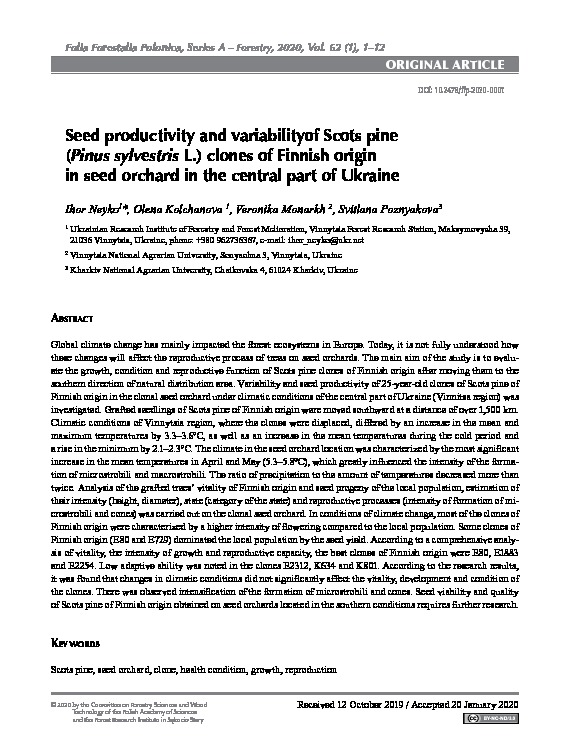id: 23905
Title: Seed productivity and variabilityof Scots pine (Pinus sylvestris L.) clones of Finnish origin in seed orchard in the central part of Ukraine
Authors: Neyko I., Kolchanova O., Monarkh V., Poznyakova S.
Keywords: scots pine, seed orchard, clone, health condition, growth, reproduction
Date of publication: 2020-03-12 15:14:53
Last changes: 2020-03-12 15:14:53
Year of publication: 2020
Summary: Global climate change has mainly impacted the forest ecosystems in Europe. Today, it is not fully understood how these changes will affect the reproductive process of trees on seed orchards. The main aim of the study is to evaluate the growth, condition and reproductive function of Scots pine clones of Finnish origin after moving them to the southern direction of natural distribution area. Variability and seed productivity of 25-year-old clones of Scots pine of Finnish origin in the clonal seed orchard under climatic conditions of the central part of Ukraine (Vinnitsa region) was
investigated. Grafted seedlings of Scots pine of Finnish origin were moved southward at a distance of over 1,500 km. Climatic conditions of Vinnytsia region, where the clones were displaced, differed by an increase in the mean and maximum temperatures by 3.3–3.6ºC, as well as an increase in the mean temperatures during the cold period and a rise in the minimum by 2.1–2.3ºC. The climate in the seed orchard location was characterized by the most significant increase in the mean temperatures in April and May (5.3–5.8ºC), which greatly influenced the intensity of the formation of microstrobili and macrostrobili. The ratio of precipitation to the amount of temperatures decreased more than twice. Analysis of the grafted trees’ vitality of Finnish origin and seed progeny of the local population, estimation of their intensity (height, diameter), state (category of the state) and reproductive processes (intensity of formation of microstrobili and cones) was carried out on the clonal seed orchard. In conditions of climate change, most of the clones of Finnish origin were characterized by a higher intensity of flowering compared to the local population. Some clones of Finnish origin (E80 and E729) dominated the local population by the seed yield. According to a comprehensive analysis of vitality, the intensity of growth and reproductive capacity, the best clones of Finnish origin were E80, E1883
and E2254. Low adaptive ability was noted in the clones E2312, K634 and K801. According to the research results, it was found that changes in climatic conditions did not significantly affect the vitality, development and condition of the clones. There was observed intensification of the formation of microstrobili and cones. Seed viability and quality of Scots pine of Finnish origin obtained on seed orchards located in the southern conditions requires further research.
URI: http://81.30.162.23/repository/getfile.php/23905.pdf
Publication type: Статті Scopus
Publication: Folia Forestalia Polonica, Series A - Forestry. 2020. Vol. 62 (1). P. 1-12.
In the collections :
Published by: Адміністратор
File : 23905.pdf Size : 1130762 byte Format : Adobe PDF Access : For all

| |
|
|